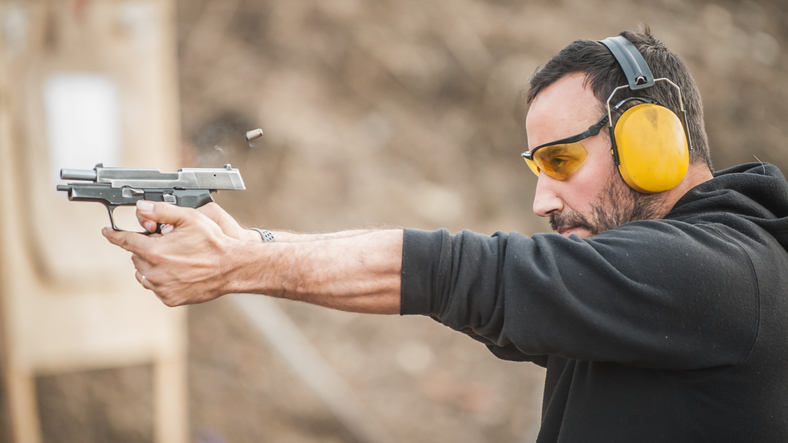
The heart of the city is always the hot spot for private investigators, so when you’re in a state with three world-class metros like Cleveland, Columbus, and Cincinnati, you know there’s bound to be a lot of cases to take and a lot of opportunities to make your mark in private investigations.
Ohio State University’s search for justice for the sexual abuse victims of a team doctor is just one example of what a career in private investigations can look like in the Buckeye State. After hiring PIs to investigate claims of abuse dating back to the 1980s, OSU agreed to pay $41 million into a fund for the victims of a now-deceased team doctor. Thanks to the tireless work of PIs on the case, not only was this settlement reached in early 2020 but the 162 victims were given some sense that justice was done.
According to the Ohio Department of Job and Family Services, the number of jobs in private investigations is projected to grow in the coming years, rising from 1,220 in 2016 to a projected 1,310 by 2026 – that’s a 7.4% increase. This steady demand bodes well for your future in private investigations, whether that means working for a PI firm, investigating injury claims with the Division of Labor and Worker Safety, or working for an insurance company building cases for fraudulent claims.
It takes just a handful of steps to earn your license to work as a private investigator in Ohio.
 | Meet Ohio Requirements to Obtain a License |
 | Obtain the Necessary Education and Training in Ohio |
 | Submit your Ohio Application |
 | Take the Ohio Examination |
 | Start Work as a Private Investigator in Ohio |
Private investigator licenses are issued by the Private Investigators & Security Services (PISGS) of the Ohio Department of Public Safety. In Ohio, a private investigator is defined as anyone who engages in the private investigation business, which includes any of the following types of investigations:
- Investigations relevant to any wrong done or threat of crime
- To obtain information on the identity, conduct, habits, affiliations, whereabouts, transactions, credibility, reputation, or character of a person
- To locate and recover stolen or lost property
- To determine responsibility or cause of any slander or libel, fire, damage to property, or accident
- To secure evidence that is used in any administration, legislative, or administrative investigation or proceeding
Step 1. Meet Ohio Requirements to Obtain a License
You must meet the following qualifications to obtain the Class B license necessary to work as a private investigator in Ohio:
- Have a good reputation for integrity
- Not have been convicted of any of the following crimes of moral turpitude
- A sexually oriented offense
- Aggravated murder
- Murder
- The violence that is a felony of the 1st or 2nd degree
- Not have been convicted within the past three years
- Felony that would affect your ability to work as a PI
- Not have been found incompetent to hold such a license
It may be possible to get a waiver from the Director if you have committed a felony within the past three years that is not a crime of moral turpitude or a disqualifying offense that would directly affect your work as a private investigator.
Step 2. Obtain the Necessary Education and Training in Ohio
To get a Class B license, the state of Ohio requires that you have two years of experience (minimum of 4000 hours) working in investigatory work. This requirement can be waived if you have equivalent experiences such as working as a military policeman, law enforcement officer, or peace officer.
If you get formal training in criminal justice, such as obtaining an associate’s or bachelor’s degree, this can count for half of your experience requirement. You can obtain criminal justice degrees from schools within Ohio or from online schools that offer this training. You will need to prove that you have obtained such a degree.

Armed PI Training – You will need to learn the basics of firearms training at a school that has been approved by the Ohio Peace Officer Training Commission and prove that you successfully completed the program. This entails 20 hours of training in using a handgun. If you plan on using other types of firearms, you will need 5 hours of additional training.
Step 3. Submit your Ohio Application
When you submit your application, you will also have to provide the following:
- Photograph (recent full-face)
- Character references (from at least 5 reputable citizens)
- Fees:
- Examination fee of $25
- A license fee of up to $375 (refundable if you don’t get a license)
- Fingerprints for a criminal background check—submitted directly to the Superintendent of the Bureau of Criminal Identification and Investigation
- Proof of liability insurance of at least
- $100,000 for each investigator
- $300,000 for each occurrence of bodily injury
- $100,000 for property damage
Forms are available on the state’s website for the PISGS. If you want to carry a firearm in the line of work, you will need to notify the Director.
Step 4. Take the Ohio Examination
After you have submitted your application for your license, you will be notified when and where to go to take your written examination. Unless you prove illness by a doctor’s certificate, you will have to appear on this date. The only exception is if you can prove that it would cause you undue hardship.
The exam will cover the state’s regulations for the private investigation business in Chapter 4749 of the state’s revised code, along with other aspects of working as a private investigator. You will have to score 80% on this 75 question multiple exams to pass it.
Step 5. Start Work as a Private Investigator in Ohio
After you have passed your exam and received your license, you will be ready to work as a licensed private investigator. You will need to keep detailed records in English of your business transactions that are relevant to the enforcement of Revised Code Chapter 4749. You will need to make these records to the Department of Public Safety if they seek to examine them.
You may want to join the Ohio Association of Security & Investigation Services to keep up with what is going on in your field and to network with fellow private investigators.
PI licenses must be renewed yearly. The fee for this is $275.
Private Investigator Salary Information for Ohio*
According to the Bureau of Labor Statistics (BLS), private investigators earn an average annual salary of $55,170 in Ohio as of May 2023. The top earners here—those who’ve put in the time and built careers based on their credibility—are looking at salaries in the top 10%, which start at $75,590.
To become a private investigator in Ohio, you must earn a license through the Ohio Department of Public Safety, which requires passing a written exam and a background check, completing at least 4,000 hours (two years) of experience as an investigator (or law enforcement officer or military policeman), and providing proof of liability insurance in the following amounts:
- $100,000 per investigator
- $100,000 for property damage
- $300,000 for each occurrence of bodily injury
If you’ve gone the extra mile and earned a degree in criminal justice, you’ll only need 2,000 hours of experience to qualify for licensure. Applicants who want to be armed must attend a school approved by the Ohio Peace Officer Training Commission.
PI Salaries in Akron, Cleveland, Cincinnati, Columbus, Dayton, and Toledo
The following BLS stats indicate what PIs in the median to top 10% salary range are earning in Ohio’s largest metro areas:
- Akron: $50,110 – $77,110 (approximately 60 licensed PIs)
- Cincinnati: $53,620 – $88,280 (approximately 280 licensed PIs)
- Cleveland: $60,790 – $65,660 (approximately 340 licensed PIs)
- Columbus: $50,670 – $101,480 (approximately 200 licensed PIs)
- Dayton: $52,000 – $69,990 (approximately 70 licensed PIs)
- Toledo: $40,880 – $64,710 (approximately 40 licensed PIs)
Among the state’s largest metro areas, in 2023 Cincinnati came out on top for having the highest annual average salary for PIs—$58,700, followed by Columbus’ $58,060. For the top 10% salary category Columbus does far better than all other cities, offering a starting wage that’s six figures and $13k higher than its closest runner up.
May 2023 US Bureau of Labor Statistics Salary and Job Market Figures for Private Detectives and Investigators reflect state data, not school-specific information. Conditions in your area may vary. Data accessed November 2024.






